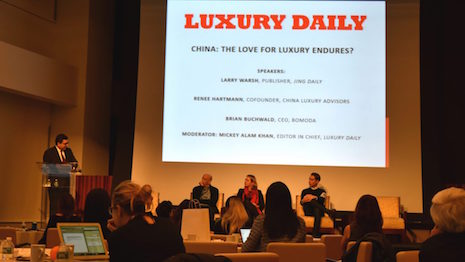 The China panel at Luxury FirstLook 2018: Exclusivity Redefined, a conference hosted by Luxury Daily. From left to right: moderator and Luxury Daily editor in chief Mickey Alam Khan (at the lectern), Jing Daily publisher Larry Warsh, China Luxury Advisors cofounder Renee Hartmann and Bomoda CEO Brian Buchwald. Image courtesy of Jing Daily
The China panel at Luxury FirstLook 2018: Exclusivity Redefined, a conference hosted by Luxury Daily. From left to right: moderator and Luxury Daily editor in chief Mickey Alam Khan (at the lectern), Jing Daily publisher Larry Warsh, China Luxury Advisors cofounder Renee Hartmann and Bomoda CEO Brian Buchwald. Image courtesy of Jing Daily
By Huixin Deng The sixth annual Luxury FirstLook 2018 conference took place Jan. 17 in New York. Arranged by our content partners at Luxury Daily, the 2018 edition, subtitled Exclusivity Redefined, included data and insights from the Boston Consulting Group, Forrester Research, Vice, Publicis Groupe’s Team One, WSJ. Magazine, Jing Daily and many others. Panelists offered their outlook on the luxury market in China this year, which included the following key takeaways. Chinese customer is a demographic concept, not a geographic one The luxury fashion market in China will continue its digital transformation in 2018, said Brian Buchwald, CEO of consumer intelligence company Bomoda. In response to this trend, brands need to take advantage of digital devices to build up a “digital relationship” with customers. Currently, he said, there are four planes of luxury shopping among Chinese consumers: domestic offline purchase, domestic ecommerce (e.g. Taobao and JD.com), international ecommerce (e.g. making purchases through daigou, international shopping agents) and shopping during outbound travels. While restrictions on Chinese consumers’ Internet access and international monetary flows are increasing, they remain global spenders. “When we talk about Chinese customers, we are actually talking about a demographic concept, not a geographic one,” Mr. Buchwald said. “Luxury brands are usually 30 to 40 percent cheaper abroad than inside of China, so Chinese customers love shopping abroad,” he said. “But still, they are the same group of shoppers, no matter where they go, and brands should be aware of this.” Therefore, sales associates in the United States should develop a global mindset, Mr. Buchwald said. He has seen sales associates befriend Chinese customers on WeChat and use the WeChat platform for customer relationship management, which he suggested would be a smart idea for brands. KOL strategies are popular, too, Mr. Buchwald added. Kris Wu is a great example of Chinese pop stars becoming international ambassadors for Western luxury brands. “To attract Chinese customers, it is important that we always create something cool for them,” said Larry Walsh, publisher of Jing Daily. “We need to know what Chinese consumers are looking for, so we can resonate with them.” Luxury travel will be "the most inspirational sector" in 2018 The outbound travel market will continue growing in China in 2018, said Renee Hartmann, cofounder of China Luxury Advisors. Ms. Hartmann has lived and worked in China for more than 17 years, and she thinks luxury travel will be an “inspirational”sector of the luxury market in the upcoming years. In the past year, Chinese consumers have made more luxury purchases outside of China than inside of China, which may account for this outbound travel trend, she said. Meanwhile, millennials are looking for more luxurious travel experiences, meaning they would like to spend more money on high-end dining and high-end hotels, whereas before they were content with “two-star hotels and bus tours.” However, this does not mean retail spending by Chinese consumers will decrease. Shopping still plays an important role in a Chinese outbound traveler’s trip, she said, even though the individual also values some other lifestyle experiences. “Chinese travelers now want to get control of their itineraries and look for more fun experience,” Ms. Hartmann said. “They may still hire a local travel agent, but traveling on their own has increasingly become a trend,” she said. Huixin Deng is a luxury business and fashion writer at Jing Daily, the leading digital publication on luxury consumer trends in China. Reproduced with permission and adapted for style.
